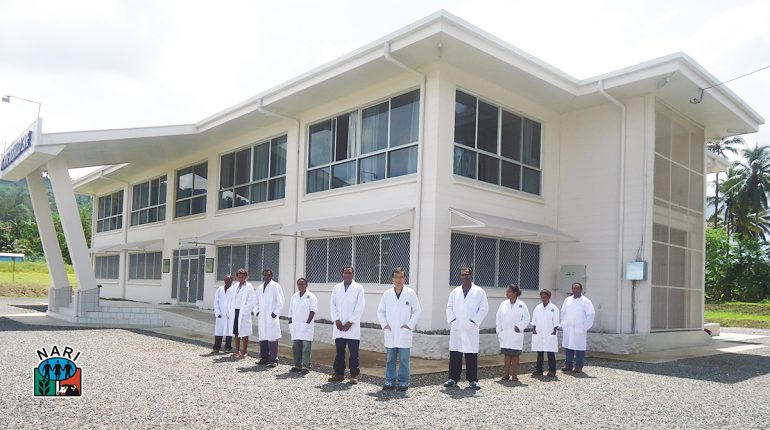THE successes gained by countries that invest in science and technology (S&T), particularly on biotechnology, are largely attributed first and foremost to visionary leadership, strong political will and commitment. In addition, the following factors play a critical role in their successes: *creation of an enabling environment for S&T and innovation and more specifically on biotechnology, *public and private investment in S&T infrastructure and biotechnology programmes; *promotion of entrepreneurship and provision of rewards for innovators; *development of key partnerships between public research institutions, private sector and the government; and *raising public awareness and acceptance of the value and potential of biotechnology applications. However, as the technology advances, governments and key stakeholders continue to respond to the challenges of ensuring environmental and economic sustainability.
The implications for PNG
For PNG to reap the benefits of biotechnology, visionary leadership and strong political commitment are prerequisites. Besides these are adequate policy, legal and regulatory frameworks and appropriate public awareness to create acceptance of the value and potential of biotechnology. Biotechnology offers a significant opportunity for improving health care, meeting food security goals, increasing the availability of drinking water, improving efficiency of industrial processes, producing high value-added products from the rich biodiversity, developing sustainable methods for aforestation and reforestation, and bioremediation. PNG should therefore focus not only on weighing the issues of the benefits and risks of genetically modified foods but put the necessary biosafety systems in place to reduce the risks to safeguard human health and the environment while simultaneously putting in place additional mechanisms to seize the opportunities and compete in the global biotechnology market place. PNG needs to urgently develop appropriate policies, set priorities and strategies and avoid increasing technological dependence by promoting and supporting appropriate and relevant innovations. PNG must address resource limitations and become an innovator.
Does PNG have the necessary resources?
PNG needs to build on existing strengths and address inefficiencies. Special attention must be given to strengthening scientific and technical expertise within the country and rationalising and modernising existing infrastructure to carry out biotechnological activities including risk assessments. Facilities for information sharing, public-private partnerships, intellectual property rights (IPR), market studies and foresight analysis are needed to support the knowledge-based environment that is required to support a thriving bio-industry. Financial investment whether from governments and/or private venture capital must be made available. Training across disciplines together with the development of entrepreneurial and management skills are necessary investments to develop the capability needed to compete on a sustainable basis.
Is this an urgent issue for PNG?
Seizing this opportunity is urgent because biotechnology is being driven to a large extent by market forces in the developed world. The pace of this trend increases the gap between the “haves” and the “have nots”. It is imperative that PNG build on and strengthen existing initiatives to increase their involvement in the globalisation of biotechnology. If PNG fails to harness biotechnology, it will lose the opportunity to better safeguard human health and the environment, generate wealth, upgrade health care systems (using new diagnostics and vaccines), improve food security and quality of nutrition, increase bio-industrial application, and raise the living standards of PNG citizens. Can regional platforms take PNG forward? Yes, biotechnology being a highly competitive industry requires regional cooperation at all levels – inter and intra regional – and this can only succeed with national support. Regional cooperation is essential given the high capital investments needed to improve and modernise the physical infrastructure and to have adequately trained and highly skilled personnel available in the country. Avoiding duplication of efforts and sharing information, knowledge and equipment at the intra and inter-regional levels are necessary for moving forward.
Role of knowledge-based institutions and scientists
Knowledge-based institutions and scientists directly involved in research and development (R&D) and innovation or in academia have a responsibility to be vigilant – continuously develop knowledge and skills, including communication skills. This would help them to remain at the cutting edge of the advances in biotechnology; better serve as advisers to policy makers, farmers and other entrepreneurs; and demonstrate through their research work and publications that the public and private investments in S&T and biotechnology can contribute to solving societal problems and wealth creation. Knowledge-based institutions and more specifically scientists need to reassure civil society, government and private sector of their commitment to value of the involvement of all stakeholders and to abide by ethical principles as they lead the development of biotechnology in PNG.
Conclusion
The overall goal is to harness biotechnology for sustainable agricultural production, social and economic development and wealth creation in PNG. It is therefore crucial for the PNG Government to seriously consider biotechnology R&D and to create incentives to promote collaborative partnerships with the private sector and the international community. The necessary policy and legal instruments must be put in place to sustain the collaboration and public/private consultations for the benefit of all. Open dialogue must be facilitated and encouraged to continuously inform and update stakeholders, especially civil society. The regulatory framework to facilitate R&D, technology transfer and trade in keeping with societal concerns must be addressed with urgency. Biotechnology, as is for numerous developing countries in the world, should be an effective catalyst in maximising return on PNG genetic resources. Opportunities to apply biotechnology in the conservation and utilisation of the genetic resources of food crops for national food security should not be missed. Household food and health security can be ensured through the mass propagation of disease-free planting materials, higher yielding crops with improved quality of desirable characteristics. Experiences and lessons learned from other developing countries should be valuable in the process of the applications of the technology in the country. To realise the full potential of biotechnology for agricultural development in PNG, policy makers should seriously consider prioritising biotechnology, investing in biotechnology, capacity building in biotechnology, developing policies for biotechnology and co-operation/collaboration in biotechnology at national, regional and international levels.
By ROBERT PLAK and RAKESH KAPILA

